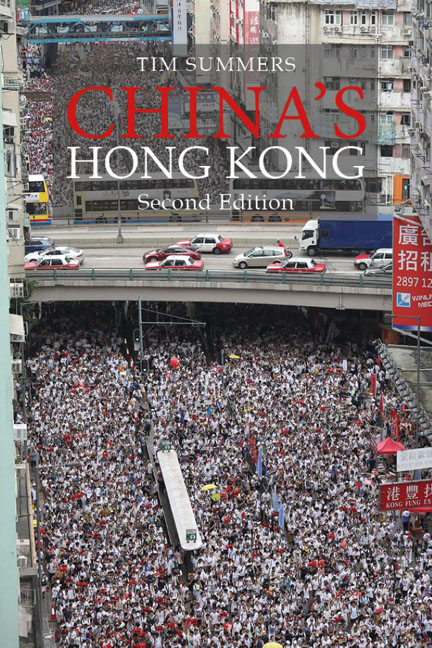Book contents
- Frontmatter
- Contents
- Preface to the second edition
- Note on transliteration
- Glossary and abbreviations
- Map
- Introduction
- 1 Hong Kong before 1997
- 2 Implementing the handover settlement
- 3 Hong Kong’s economy, globalization and the rise of China
- 4 The Occupy movement and its aftermath
- 5 International dimensions of the Hong Kong SAR
- 6 A year of protest
- 7 Hong Kong’s future
- Timeline: Key dates in Hong Kong’s political history
- Notes
- Index
2 - Implementing the handover settlement
Published online by Cambridge University Press: 20 December 2023
- Frontmatter
- Contents
- Preface to the second edition
- Note on transliteration
- Glossary and abbreviations
- Map
- Introduction
- 1 Hong Kong before 1997
- 2 Implementing the handover settlement
- 3 Hong Kong’s economy, globalization and the rise of China
- 4 The Occupy movement and its aftermath
- 5 International dimensions of the Hong Kong SAR
- 6 A year of protest
- 7 Hong Kong’s future
- Timeline: Key dates in Hong Kong’s political history
- Notes
- Index
Summary
How successful has the handover settlement been? To address this question, we need to examine factors which have affected it and Hong Kong's development more widely, from those within Hong Kong to changes in China and the global environment. This chapter approaches this question chronologically and thematically, beginning with the early implementation of “one country, two systems”. It discusses a series of crises that Hong Kong faced, from the Asian financial crisis of 1997–8, to the double crises of 2003 when Hong Kong was hit by the SARS epidemic and saw massive protests against proposed national security legislation, and the global financial crisis of 2008 and its aftermath. Throughout this period, the difficult issue of political reform and the introduction of more democracy was never far from the surface. In Chapter 4, we shall pick up the story again by examining developments around the Occupy movement in more detail.
The scope for different interpretations of the handover settlement is relevant to any assessment of its implementation. For example, while many in Hong Kong have focused on the question of democratic development or the preservation of basic rights and freedoms as indicators of the success of “one country, two systems”, in Beijing the more important points have been to do with upholding national security and territorial integrity, or the implications of the rise of “anti-China sentiment” in Hong Kong. Although this chapter argues that much has been achieved in implementing the handover settlement, the political reality is a certain degree of dissatisfaction on all sides of the debates.
To start with the most basic elements of the handover settlement, China resumed the exercise of sovereignty over Hong Kong on 1 July 1997, and the UK continued to administer Hong Kong until that point. The Hong Kong SAR was established in accordance with the Chinese constitution, and the primary Chinese objective that Hong Kong's handover would signify a step forward in national reunification – taken further by the return of Macao to China from Portugal in 1999 – was achieved.
Information
- Type
- Chapter
- Information
- China's Hong KongThe Politics of a Global City, pp. 33 - 54Publisher: Agenda PublishingPrint publication year: 2020
